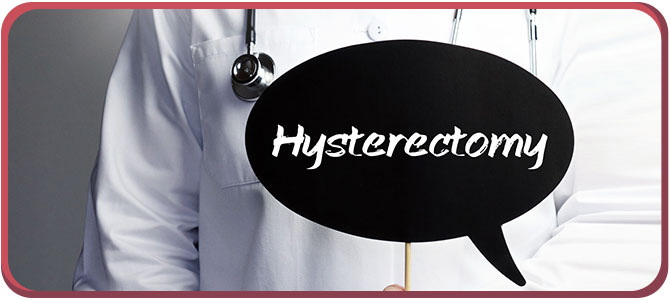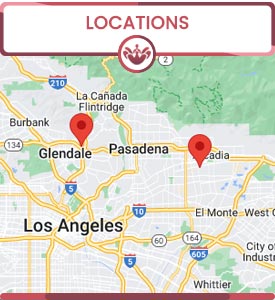Vaginal Hysterectomy Specialist in Arcadia CA, and Glendale CA
Vaginal hysterectomy is a procedure that treats vaginal problems including fibroids, benign tumors, persistent bleeding, anemia, pelvic pain, pain during intercourse, and bladder pressure. We offer vaginal hysterectomy at The OB-Gyn & Incontinence Center. Visit our clinic and get your procedure done. For more information, contact us today or book an appointment online. We have convenient locations to serve you in Arcadia, CA, and Glendale, CA.


Table of Contents:
What is a vaginal hysterectomy?
Why is a hysterectomy performed?
Who performs vaginal hysterectomy?
Which kind of vaginal hysterectomy is the safest?
What questions should I ask the doctor before having a hysterectomy?
A vaginal hysterectomy is a surgical procedure in which a woman’s uterus is removed through her vagina. The uterus, or womb, is the organ in a woman’s body where a fertilized egg implants and grows into a fetus during pregnancy.
During the procedure, the surgeon makes small incisions in the vagina and detaches the uterus from the ovaries, fallopian tubes, and other surrounding structures. Next, the uterus is removed through the vaginal opening. This type of hysterectomy is less invasive than an abdominal or laparoscopic hysterectomy, which requires incisions in the abdomen.
A vaginal hysterectomy is typically performed for several reasons, including:
● Abnormal uterine bleeding – Heavy or prolonged menstrual periods, or abnormal bleeding between periods, can be caused by a variety of conditions, such as fibroids, endometriosis, or polyps. A hysterectomy can be used to treat these conditions and stop the bleeding.
● Uterine prolapse – Uterine prolapse occurs when the muscles and ligaments that support the uterus become weak, causing the uterus to droop or sag into the vagina.
● Cancer – Uterine cancer, cervical cancer, and ovarian cancer are some of the types of cancer that may require a hysterectomy.
● Endometriosis – This is a condition in which the tissue that lines the uterus grows outside of it, causing pain and bleeding.
● Fibroids – These are noncancerous tumors that grow in the uterus, which can cause heavy bleeding, abdominal pain, and pressure on the bladder.
● Chronic pelvic pain – If other treatments haven’t worked, a hysterectomy may be recommended to relieve chronic pelvic pain caused by conditions such as endometriosis or pelvic inflammatory disease.
A vaginal hysterectomy is typically performed by a gynecologist or a specialist physician who has completed training and education in the field of women’s reproductive health. Gynecologists are qualified to perform a wide range of procedures related to women’s reproductive health, including vaginal hysterectomies. In some cases, other specialists may assist the gynecologist during the procedure, such as an anesthesiologist, who will be responsible for administering anesthesia, or a urologist, who may be involved if the woman also needs surgery on her urinary tract.
All types of hysterectomy, including vaginal hysterectomy, carry some risks and potential complications. However, vaginal hysterectomy is generally considered to be a safer and less invasive option than abdominal or laparoscopic hysterectomy.
A vaginal hysterectomy is performed through the vagina and does not involve any abdominal incisions, which means there is less risk of complications such as infection, bleeding, and injury to other organs. Additionally, a vaginal hysterectomy typically requires a shorter recovery period and has a lower risk of complications such as hernia or incisional pain.
If you are considering a hysterectomy, it’s important to discuss the procedure with your doctor and to ask any questions you may have. Some potential questions include:
● What are the advantages and risks of the surgery? Understand the potential risks and benefits of the procedure and how it may impact your overall health and quality of life.
● What type of hysterectomy is recommended? There are several types of hysterectomy, including vaginal, abdominal, and laparoscopic. Ask about the specific type of procedure that is recommended and why.
● What are the potential complications? Understand the potential complications of the procedure and the steps that will be taken to minimize the risk of complications.
● What is the recovery period like? Ask about the recovery period, including how long it will take to return to normal activities, any restrictions on physical activity, and what you can expect in terms of pain and discomfort.
● How to prepare for the surgery? Ask about the pre-surgery procedures, any medications to avoid, and what you should do to prepare for the surgery.
● What to expect after the surgery? Ask about the post-surgery care, follow-up appointments, and what to expect in terms of recovery and healing.
For more information, contact us today or book an appointment online. We have convenient locations to serve you in Arcadia, CA, and Glendale, CA. We serve patients from Arcadia CA, Glendale CA, Monrovia CA, Pasadena CA, Los Angeles CA, Burbank CA and surrounding areas.


Additional Services You May Need
▸ Urogynecology
▸ Minimally Invasive Gynecology
▸ Monalisa & Medical Aesthetics
▸ Bioidentical Hormone Replacement Therapy
▸ Urinary Incontinence
▸ Pelvic Organ Prolapse
▸ Painful Bladder
▸ Urinary Tract Infection
▸ Genitourinary Syndrome of Menopause
▸ Female Sexual Dysfunction
▸ Urinary Retention
▸ Vaginal Laxity & Prolapse
▸ Postpartum Pelvic Floor Problems
▸ PCOD
▸ Bladder Prolapse Repair
▸ Vaginal Hysterectomy
▸ Urgent PC
▸ Fibroids
▸ Excessive Bleeding
▸ Pelvic Pain
▸ Birth Control & IUD
▸ Vaginal & Pelvic Infection
▸ Monalisa Touch
▸ STD
▸ TempsureVitalia
▸ Biote Pellet Therapy
▸ Topical BHRT
▸ Labiaplasty
▸ Flexsure
▸ Rectal Prolapse Repair
▸ Tempsure ENVI
▸ Minimally Invasive Pelvic Surgery for Incontinence


